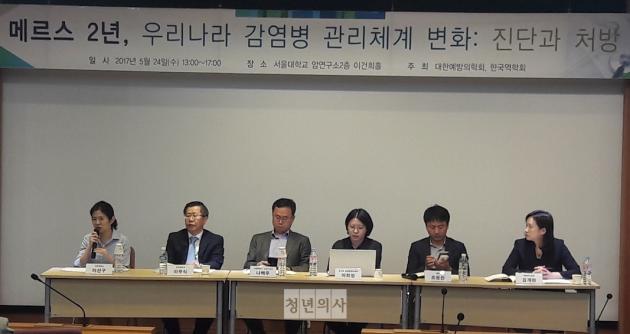Two years have passed since the Middle East Respiratory Syndrome (MERS) threw Koreans into the fear of infectious disease, but Korea’s public health system remains fragile.
Although the government has made some improvements, the country has a long way to go before completing infectious disease-related governance by, for instance, training public health experts and supporting research activities.

These were the prevailing sentiments at a symposium Wednesday to discuss possible reforms in infectious diseases management systems, jointly organized by the Korean Society for Preventive Medicine and the Korean Society of Epidemiology at the Seoul National University Cancer Research Institute.
“We should never forget the lessons we learned from the outbreak and work toward solving problems such as improving the infectious disease management governance system and nurturing public health professionals,” said Kim Hye-kyung김혜경, head of Suwon Public Health Office.
Noting that Korea could learn about the problems and limitations of its public health system through the MERS outbreak, Kim said, “We lacked the proper human resources and organizational structure because we had focused only on the projects carried out by the public health system. We operated a national welfare policy that lacked concentration on the public health system compared to the medical system.”
Kim added that Korea has yet to distinguish the difference between public health and medical care, saying, “We did not understand the importance of public health professionals and their required capabilities.”
The country was not aware of the importance of preparedness concerning infectious diseases on a regular basis due to the lack of interest in the field, Kim said, adding that Korea has begun to recognize the importance of crises preparedness and response only after suffering from the massive losses in the aftermath of MERS.
However, Kim criticized that problems remain although two years have passed since, and systemic improvements that reflect the voices of those in the field should still be made.
In this regard, Kim suggested creating a governance system of central and provincial governments, strengthening the provincial infectious disease management organizations, and implementing systematic training of public health experts.
The provincial government should take responsibility for field command, and the central government should act as the supporter and controller of their efforts, Kim said. The central government should begin to trust local governments, considering that infectious diseases occur mainly in those regions and because the local administrative capacity has improved significantly since 20 years of autonomy.
Other participants at the symposium raised the need for systematic training of public health professionals and support for research on infectious diseases.
Professor Lee Hee-young이희영 of Bundang Seoul National University Hospital분당서울대병원 said, "We cannot increase our skills without practical experience. The government should fund researchers to go abroad and participate in research on infectious diseases such as Ebola.”
"If we send out public health experts overseas and conduct research on infectious diseases in other regions, we will be able to contribute to the improvement of our country's infectious disease research and coping ability," he added.
Some argue that Korea’s biggest problem in dealing with the infectious disease is governance related, raising the opinion for the Ministry of Health and Welfare to become an independent organization.
"In 2002, the number of health care workers accounted for 40.7 percent of the public officials in the Ministry of Health and Welfare. In 2013, the number decreased to 31 percent, while the number of civil servants in the social welfare sector, and their budget, has steadily increased," said Professor Park Eun-cheol박은철 of Yonsei University College of Medicine.
“Many of the policies we deal with can be efficiently processed by the ministry alone, and there is no significant challenge in the ministry operating as an independent agency,” Park added.
Noting that 61.8 percent OECD countries are separating health and welfare from the central ministry, "Korea should also ensure professionalism by changing the Ministry of Health and Welfare to the Ministry of Health,” he said.
He also commented on the rumor that the current government is pursuing a multi-loan system, saying that although it is not the best solution as separating the ministry into an independent organization, it will be a partial settlement of the problem.

